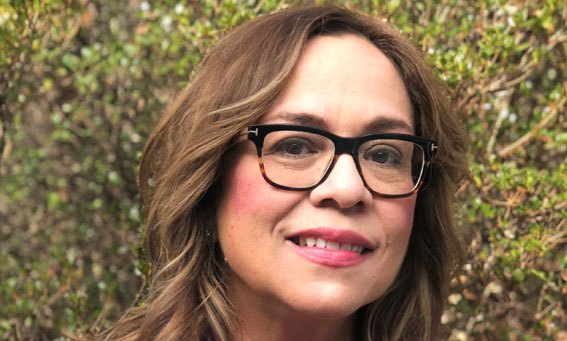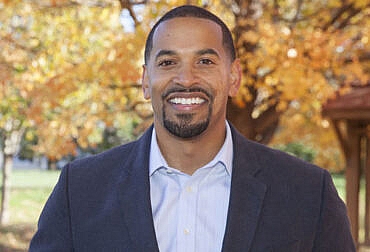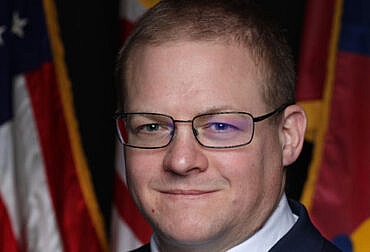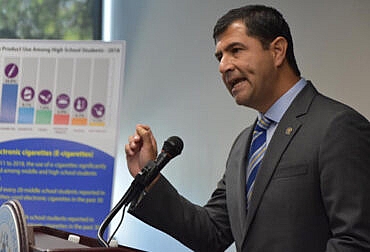Nagender Madavaram is the editor of the BetterMoCo.com portal. He discussed with Councilmember Nancy Navarro about her vision, agenda and issues facing the County. This is the first of a 2-part transcript of the interview which covered the topics of her service to the community, people of color and the police.
Nagender Madavaram: You are the first Latino woman elected to the County Council. You broke the ceiling and inspired many candidates. When you revisit your political struggles, how do you feel about your achievements?
Nancy Navarro: Well, thank you and again thank you for creating this space. I am a firm believer that information is key, especially in today’s society, where there’s just so much coming at you. Civic education, to me, is the key to making sure that residents have a seat at the table when it comes to their political process and civic process. I appreciate you creating this space; It’s very important. As you mentioned, yes, I’m the first Latina woman ever to be elected to the County Council and the first immigrant. I came to the United States when I was ten years old with my father who was doing graduate work in Missouri and went back to Venezuela, which is where I was born. I came back to the US to go to college when I was 17 years old in 1983. I stayed, I met my husband and we established our family here. Our roots are here in Montgomery County and we have two daughters. We raised them here and they are MCPS graduates and Howard University graduates. When I reflect back, public service was my way to reconcile the fact that the United States was going to be my adopted country and I was very nostalgic of the fact that my entire family was back home in Venezuela. I was appointed to the Board of Education in 2004 and then I ran for the Board of Education in 2006. I ran for the County Council in 2009. That was my way to give back to this adopted community. My husband and I were very committed to this notion of public service. He’s an entrepreneur and I took a different route. I never thought about my gender when I was going to go into politics, but I had a moment. I had an epiphany when I realized that there were so many issues that needed to be addressed. I could see the demographic changes that were coming. I knew that we needed to have different perspectives at the decision-making table. That’s why I decided to run.
I was the person who always wanted to be in the background, or I wanted to do strategy from behind the scenes. I never wanted to be the person in front, but destiny had a different plan. I feel really honored for this opportunity. As you mentioned, in terms of struggles, there were many. There were so many lessons learned along the way as well. I feel like as a resident of Montgomery County, I understood that I am here to create an opportunity for everyone. We lead from the heart with generosity. I think that’s why I’ve been embraced and was able to be reelected time and time again. I feel really good about this experience and for the opportunity that I have had to enhance the quality of life of my district and the county.
Nagender Madavaram: Did you achieve your goals and aims in public life? What are the unfinished items in your agenda as your term is ending in 2022?
Nancy Navarro: Sure, I would say that, in terms of some of the items in my policy agenda that I’m super proud of them. Number one, I chaired the Fiscal Policy Committee for the Council, which is the committee that establishs the fiscal policies for the county. I have been the chair since 2011 and I have had to shepherd, along with my committee members and the County Council members, fiscal policies that have led to the county retaining its AAA bond rating even in this pandemic. I’m very proud of that because it means that we are solid in our commitment to be true to our fiscal policies, and that the county has a very strong footing. I’m also very proud of the fact that in 2019, I created an economic development platform to serve as a guide for the county in terms of our economic development goals. The platform includes targets and goals for housing, transportation, workforce development, business development, retention, and expansion. I am also very proud of the fact that I have been targeting those areas of the county that had been historically neglected for revitalization or redevelopment. We’ve invested $40 million in infrastructure and the goal is to make a vibrant hub for life sciences, so that biotech companies can be right next to the FDA, to create jobs for people and bring needed amenities. I was able to shepherd funding to make sure that the design and the materials etc. were of the highest quality for our library and recreation center combination, which is state of the art.
The Wheaton High School building is the first of its kind in the county. The building has won awards because of it’s a Platinum LEED certified building, which is the highest designation that you could have when it comes to environmental stewardship. The downtown redevelopment, which has the Parking and Planning Headquarters and a wonderful Plaza for all the residents to have their festivals and their gatherings. All in all, that was $400 million worth of investment for Wheaton, which is an area with extraordinary potential. We’ve also been focusing on middle-income housing, which is a step of housing we don’t have a lot of in the county. In 2019, I was the Council President, and it was my second time being Council President. It was a time to really help and guide in a transition of leadership in the county of a new County Executive and few new Council members. I took that responsibility very seriously. I also had some policy agenda that I wanted to move through. One of them was the racial equity and social justice law, which now means that every single decision that County Council or the Executive makes must have a racial equity and social justice impact analysis with data so we can understand if our decisions are helping close disparities or exacerbate this crisis. We’ve invested over $1,000,000 in standing up that infrastructure with an office, with staff, and with a policy officer. That is important because it’s a structural component that is going to, in my opinion, serve through the years. It will serve to hold elected officials and policymakers accountable for closing those persistent disparities.
I was also the author of the Early Care and Education Initiative for the county, and that is a four-year plan with targets for how many high-quality childcare slots do we want to create? How can we address issues of affordability? This was in 2019. We were going to have to deal with a renewed reckoning with systemic racism. We were going to have to face this extraordinary pandemic where things like childcare was a challenging one. So, when I look back, I am in awe of the fact that that was the year 2019 during my Presidency, where there was a lot of important work that was accomplished. It’s almost like we were preparing for this crisis without even knowing that we were preparing for the pandemic. I’ll just mention one piece, being focused on racial equity was important because when the pandemic hit, we very quickly began to analyze the data of which ZIP codes were most affected by the pandemic. In terms of cases, they are the ZIP codes where we have a majority of Black and Latino residents live. I immediately began to track that, and then proposed to create the Latino COVID-19 initiative and an African American COVID-19 initiative to focus strategically on addressing the issues in those communities so that we could have better results. Just imagine if we didn’t control the virus in these communities; It was going to affect everything around the county. I’m proud to report that the vaccination program is going great for the Latino community, because now the community vaccination rate is higher than the vaccination rate of the White community. This is never that way as well as for our Black community. We were able to achieve that because everyone had this lens of racial equity and social justice because we understand that if you don’t address the issues in communities that have been disproportionately affected, that has an impact on the entire county. Of course, these are just few things, but I think it summarizes a lot of my priorities throughout the years.
Housing:
Nagender Madavaram: Housing is major problem in the County. Workers of essential services are living in other counties as they can’t afford to reside in the County. What solutions do you propose to provide homeownership to essential workers and low-income groups?
Nancy Navarro: That is a very big challenge for not just Montgomery County, but the region as well. I’m a member of the Board of the Washington Metropolitan Council of Government. We have focused very much, during 2019, on the issue of housing. The work group adopted particular targets for the region and then also for our particular jurisdictions. For the region, the target is to add at least 320,000 housing units between 2020 and 2030. The target is also that 75% of those new housing units to be in activity centers or near high-capacity transit and 75% of the new housing units should be affordable to middle income households. So, for Montgomery County, that translates into an additional 10,000 units between 2020 and 2030. We are addressing the adding of the 10,000 houses at the Council and everybody has agreed. So, what does that mean? We have a challenge in our hands because the County has decided to support a very important policy, which is that we have an agricultural reserve.
We have almost 30% of land that has been reserved for agricultural use, which is very important for environmental reasons. I am very adamant about protecting the agricultural reserve. It also means that we don’t have a lot of land available and so we need to rethink how we look at redevelopment and how we look at providing opportunities for more housing. We need to look at high-capacity transit areas around metro stations and look at activity centers. We need to understand that if you close-up the ability to build more housing, then this issue is going to get worse. If there are less units, it means that it’s going to be more expensive. We need to figure out number one: How do you produce more residential units? Where should they be located? Then you must understand that the County government is going to have to subsidize, invest and find ways to leverage particular incentives. For example, deferment of property tax, giving tax credits and actually making sure that we have a good amount of money in a fund so that we can partner with nonprofit housing organizations and maybe acquire particular units if we need to redevelop them. It also means that we have to preserve what we have. We have some current affordable housing, so we must preserve that as well. We have to make sure that we create affordable housing and we build affordable housing throughout the county, not just concentrate them in one part of the county, which is what has happened in the county for many years. Historic decisions around redlining and covenants of where people of color could only live-in certain parts of the county. We must shift that because when you concentrate too many low income or affordable housing units in one place then you have other issues that you must address. We must make sure that we are adamant about preserving existing affordable units in current order, then work on adding more. We’ve been working on a lot of these options. I think there’s a lot of good work happening and a lot of great things have already been done. It’s going to take a lot of commitment going forward.
People of Color:
Nagender Madavaram: You took the lead and formed a group with Valerie Ervin and Karen Britto to involve minorities in the government process. You also did many activities in the Latino community. What are your current and future activities to integrate minorities into the mainstream system?
Nancy Navarro: There are two tracks for that I’ve been working on. One of them; I began to represent District 4. When I was elected, the redistricting process started right away, and the boundaries of my district changed. I started representing Wheaton, which is the epicenter of the Latino community in the county. One of the things that I noticed was that as I would meet with parent, especially Latino parents, about education issues, they started bringing up other issues and other policy areas that they were concerned about. Very soon it was clear that there was a need for civic education in the Latino community because they did not know how to participate and how to affect change in their community. In their home countries, it’s a different system. So, I decided to do almost like a pilot program. A staff member in my office and I together developed a curriculum. She began to teach this curriculum in title one schools in Holiday Park, senior centers, and apartment complexes. We began to build the civic knowledge base of a community. Very soon those people became civic ambassadors in their communities. They began to come, testify, and participate. It was almost like an experiment in terms of what I wanted to do, which was to provide direct access to where the decision making happens. I also made sure that the County Council is building their own internal structure to be able to facilitate that participation, because a lot of times we say that the immigrant community doesn’t participate, or they don’t care about these issues. It’s because we haven’t taken the time to inform the community on what are the processes. If you just do that when they present themselves when they come to the institutions, the institutions are not ready to facilitate their participation for various reasons. They may not have interpretation services, communication specialists, and participants may speak different languages. So, I began through my committee, and government operations in the Fiscal Policy Committee to strengthen our communications office to have capacity in different languages, to have someone specifically to be a communication person that looked into the Spanish language. The communication person puts subtitles on the monitors in the hearing room. So, if somebody came to testify in their language, the subtitles would say what they’re saying in English. We made it as easy as possible so when somebody comes, then the person feels welcome. Participants feel that they can contribute in discussions. You have to build the civic knowledge base but the institutions have to meet halfway, and that is something that I think every governmental institution needs to think about. Especially, in a county like ours that is so diverse, so this is not just about doing a nice thing for somebody. This is about being responsive for our residents, so that’s been important in terms of civic participation, in terms of the political side. As I mentioned, I did join a group as a Co-founder in presidential campaign, but this had to do with Venezuelan Americans. I’m only one of two elected officials from Venezuela in the country. We created a group to try to combat the misinformation and disinformation in South Florida regarding the Democratic nominee, which was a very eye-opening experience. That’s like another program altogether, but it was very important for me, personally to make sure that we did everything possible to change the person in the White House. Obviously, we were heading in a very bad, very wrong direction and so that was a learning experience for me. I’ve been in the United States since 1983. I grew up here, I’ve only lived 15 years of my life in Venezuela. Even though South Florida did not go for Democrats, I think there’s a lot of work to be done and opportunities that we were able to plant the seeds of and they are taking root for the next cycle.
Nagender Madavaram: You have been wonderfully serving to the community, earlier you attempted to have a coalition of people of color. Do you have any plans to build a coalition?
Nancy Navarro: Well, you know I wish I had. Instead of 24 hours a day, I wish we had 48 hours a day so I could do a lot of things. It’s not easy to do that. I did work very hard with the Latino Democratic Club to help, shape, and bring it to a different level. This was two years ago. I decided to dedicate two years to assist, advise and help out. I think they were able to get a lot of really good things done. When it came a time for me to take a step back, and other people had to take over. There are moments when different democratic clubs come together. I still think there’s a need, not just in the county level, but at the state level to take more ownership and to come and work together. There’s a lot of work that must happen with making sure that our community see the leadership working together and that is something that I’m very committed about. I don’t have any particular plans right now to launch anything, but anytime, especially people who want to run for office especially, people of color and women of color who have commonly asked me, I always take the time and I share everything I need to share. I give advice if I’m asked because I want to make sure that whatever folks are going to do, that they understand that it’s not a walk in the park, but at least they have some tools that they can use to move forward. I feel like I’m always available to advise others who are coming up to also take the baton and also put in the work.
Police
Nagender Madavaram: Defunding police is popular slogan. What is your stand on it?
Nancy Navarro: I believe that we have to be very strategic about enhancing the capacity when it comes to prevention. I’m talking about mental health support. I’m talking about investing in after school activities, infrastructure, programs and initiatives for young people. That is really important. I also believe that we have to look at how do we do police reform. The County Council has already passed a number of bills for police reform. However, I’m also mindful that especially in communities of color, I have represented, the feedback that I have gotten throughout the years since I joined the Council, is that there’s some areas where they feel that they have no protection. They feel that there’s not enough police and therefore it opens up those communities for people to come in and commit crimes. Many of those people are from other jurisdictions. They come because they know that there’s not many police presence in those communities. So, it is important to understand that there has to be a balance. The police force must be a police force of the highest caliber that respects people’s civil rights and human rights. That is absolutely important. We also need to be careful with just generalizing and thinking that we can speak for everybody because defunding or getting rid of the police means that our quality of life will be affected significantly. Public safety is one of those things that is so important when people are trying to find a place to live. It doesn’t matter if you have a high income or a low income, you’re looking for safety. Especially, for some immigrants who have left countries where they don’t have a police force of any kind. That is one of the reasons a lot of people flee their countries for safety. I am very mindful of how do we create a balance. Police officers should not be in the business of responding to issues that can be handled with mental health professionals. We need, again, to be very focused on enhancing opportunities and creating job opportunities for young people and for others. All of that goes into this notion of public safety. So, that is where I stand, and I will continue to work with my colleagues and the Community to make sure that we find the balance that we need to find.











